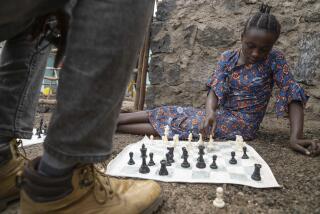Young Pawns Struggle to Be Kings and Queens : Poverty: Two Camden, N.J., officers are trying to stop the killing. As city’s homicide rate soars, they use chess to teach inner-city kids about caring--and friendship.
- Share via
CAMDEN, N.J. — Officers Bill Reed and Michael Williams were weary of mopping up the blood of Camden’s young people. Perhaps they could not end the carnage, but they believed they had a weapon that might help.
That weapon was chess.
“Thinking four moves ahead, that’s our motto,” Williams says. In chess, a player must consider the consequences before making a move--a lesson that can mean the difference between life and death for inner-city kids.
Camden is the poorest city in the state and the fifth poorest in the nation. Nearly half the city’s 87,000 residents are under 21, but there are no bowling alleys or movie theaters.
But there is no scarcity of murder. With more than a month left in the year, the city surpassed its previous homicide record of 50.
“I got so tired of picking these kids up off the street dead,” Reed said. “They’re killing these kids at such a rate--it’s unreal.”
So Reed and Williams started a Monday night chess club to get kids off the street, and to teach them some skills that might save them when they returned.
“This is the best part of my day,” Williams said when he arrived at East Camden Middle School’s cafeteria, still wearing his uniform after a full day’s work. Two dozen boys and girls were there to greet him.
Williams said it takes only 20 minutes to teach them the basics of the game. After that, it’s on to advanced strategy.
“Almost all these kids have never played chess,” Williams said. But they prove to be quick studies.
“These are inner-city kids who aren’t supposed to be that bright, and look at them. Look at the concentration,” Reed said, glancing down the long table where the youngsters were hunched over donated plastic chess boards, intently pondering their next moves.
“I wanted to not only prove a point, but prove it to these kids,” Reed said. “I believe in all these kids. I let them know there is hope and people care.”
“I didn’t know how to play when I came, but I learned fast,” said Jose Perez, 17, who joined the club when it started last spring.
Farther down the table, Reed’s son, Atiq, 14, is deep into a game with James Hatcher, 13. James knits his brow and frowns as he decides what move he’ll make next. He starts to pick up a piece, then puts it down.
After a few hesitant starts, James makes his move. “Check!”
Atiq takes his turn, then James moves another piece. “Check!”
Another move, another countermove with a different piece. “Check!”
Finally, James moves yet another piece. “Checkmate!”
James exults as he knocks over Atiq’s king and raises his arms in triumph.
“I’m the champion now!” the eighth-grader gloats to his friend.
The program involves more than chess--it builds confidence and self-esteem. The pizza that is served is also important; for some of these kids, it is the only hot meal they will eat all day.
“We basically have the kids nobody wants,” Williams says. “They have nothing to do.”
Reed, 37, talks to the kids in their own language, yelling, “What’s up?” when they arrive at the school. When they call out his name, he fondly responds, “Yes, baby.”
“We’re not going to be daddies, but we can be a friend,” Reed said.
Reed uses chess lessons to counsel the youngsters to stay out of trouble. Kareem Jenkins, 11, a newcomer, got his first lesson a week before.
“You don’t ever want to be a pawn in life,” Reed advised him. “You can always throw away a pawn. You want to be a king or a queen.”
Preston Brown, 9, says he likes playing against older opponents.
“You beat bigger people,” said the slender fifth-grader, “and they’re like, ‘The little guy beat me.’ ”
Williams said they have been asked to help set up similar programs in neighborhoods across the nine-square-mile city. Reed said the duo hopes to inspire others to get involved in helping youngsters in the city. Both officers live in Camden.
“This shouldn’t be news,” Reed said. “It should be common.”
More to Read
Sign up for Essential California
The most important California stories and recommendations in your inbox every morning.
You may occasionally receive promotional content from the Los Angeles Times.













